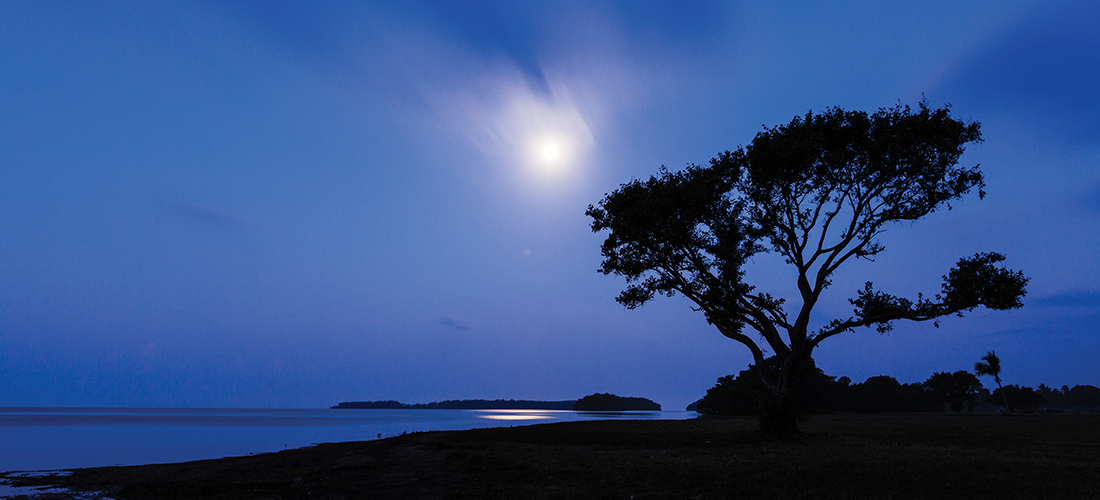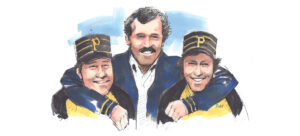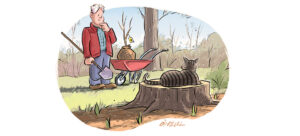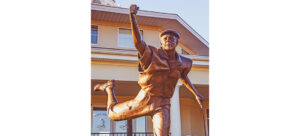
All on the Line
A full day in a full life
By Tom Bryant
It had become a ritual with the old man. Every morning he would fire up the little gas stove in the Airstream, put the percolator on with enough coffee for four cups, two for now and two for later, which he would carry in his ancient bent thermos. Then he would warm four biscuits stuffed with country ham that he had cooked the evening before. The ham reminded him of home and the family farm. He missed the everyday rigors of farming but realized with the last doctor’s report that it was time to let that stage of life go. Two of the biscuits were for breakfast, and two were for lunch, when he would pull his skiff up on a mangrove key and wait for the tide to change.
His fishing gear was stowed under the awning of the compact camper he had bought years before at about the same time he had been able to purchase the lot on Halfway Creek. The small tidal creek, more a stream really, flowed out of the Everglades and was more brackish than fresh water. The evening before he had been able to net mullet for bait to use on the tidewater change in the bay.
His wife of 50 years, Hensilee, was away from the camp visiting one of the children in Fort Lauderdale, so he had all the doings to himself for a couple of weeks. A solitary man, he enjoyed the quiet of his little piece of property and never got tired of watching the sunsets across the Gulf. More times than not, he would be motoring back across the bay heading for home when the sun began its march toward evening. He would get there in the lowering light in time to clean the day’s catch, fix a bite of supper, and then relax in his favorite camp chair out on the dock that housed his archaic skiff.
He liked to say that he was a keeper of God’s nature and always gave more than he took. He actually grew up on a farm in the low country of South Carolina, a farm that had been in his family for generations. In the last year, he had passed the mantle and responsibility of the farm to his oldest son and now was at home on his creek in the closing stages of his life, doing what he loved most.
He paused briefly before walking down the short path to the dock where his little skiff rested, then went over his supplies for the day. Plenty of water in a two-quart canteen, never can have too much water on the bay. His daypack filled with lunch and other necessities that he had accumulated over the years, like his fillet knife and the first-aid kit he had built from scratch. His fishing rig consisting of a bait-casting rod and reel, a surf casting outfit he had converted to boat use, and a venerable fly rod that he loved to employ in the shallow salt water flats bordering the mangroves, just before the deeper water of the Gulf.
His skiff, he liked to say, was one of a kind, and it truly was. Built by a grizzled old Florida riverboat captain he had known for years, it was acquired after much negotiation. The captain’s health necessitated his move north to be close to family and was the only reason he’d agreed to sell.
It was a strange looking craft with a diesel motor amidships, almost like the ones on small John Deere tractors. It made a pockety-pockety noise recognized by anyone who had ever been around farm tractors.
The skiff was about 17 feet with a wide shallow V-beam that made it extremely seaworthy, yet with a very shallow draft. In front of the motor housing was a wooden half console, and at the bow was a covered enclosure for gear. A fish live well was located on the stern. All in all, an unusual boat. Slow, but as the old man often said, if he had to hurry, he wouldn’t go.
With the sure movements of many repetitions, he loaded all his gear, fired up the engine and slowly cruised down the creek toward the bay. He had one more superstition: He tapped his left shirt pocket for the reassuring, familiar feel of his bottle of nitroglycerin pills.
He’d had his first heart attack young, at 45. His second came 20 years later, in the same month as the first. It was January. He always said that it was the cold that precipitated the attacks; and after the prognosis of the doctors, he bought a winter place on the St. Johns River close to Astor, Florida. When that location wasn’t warm enough in the winter, he found and purchased the little piece of land on Halfway Creek.
His family doctor was brutally factual about his health. “You’ve had two heart attacks. The next one will take you away.” That’s when he prescribed nitroglycerin pills to help with the old man’s angina.
The ride out toward the bay was as restful and beautiful as usual; and in a short time, he was to the Ten Thousand Islands that bordered the Gulf. They weren’t really islands but mangroves that grew in the salt water with numerous twisted roots that would trap sand during tidal flows and create little islands, or keys, as the natives call them. He had worked with a local fisherman when he first began fishing the mangroves and learned the area as well as the river he used to fish back in South Carolina.
There was a miniature mangrove island that he named Fiddler Key because of the fiddler crab population. Every time he slid his skiff to the water’s edge, the beach looked as if it was moving, it was so packed with little crabs. The males’ greatly enlarged claws would be waving back and forth as they hustled on down the strand looking for places to hide. He would trap 15 or 20 to use as bait for what he called his favorite eating fish, the sheepshead.
Sheepshead love to hang around the mangroves because of their diet of crustaceans and barnacles that grow on the roots. The fish, which can grow up to 4 pounds, also have a great fondness for fiddler crabs, and the old man rarely missed catching four or five sheepshead around the islands.
In almost no time, he pulled five keepers into the boat and deposited them in the live well. He then fired up his skiff and headed out to the mangroves bordering the Gulf. It was almost time for lunch, so he baited his converted surf casting rig with a mullet and cast out where the deep water began. Then he tied up to a mangrove and ate lunch. It was also his tradition to take a little nap after lunch, so he put up his boat awning over the bow and nestled down on several boat cushions and dozed.
The drag on the reel awakened him and he sat up, grabbed his rod and leaned back to set the hook. Whatever was on his line was big, and the drag screamed as the fish took more line off the reel and headed for deep water. Nothing to do but cut the line or follow it in his boat.
He wanted to see this fish, so he placed the rod in the gunnel holder, untied the skiff, fired up the motor and chased the fish out in the Gulf.
The battle went on all afternoon. The fish would take out more line, and he would use the skiff by motoring toward the fish to help him recapture his lost effort.
As the sun was beginning to set, he finally decided to give up. The fish had him beat. Just as he was about to cut his line, he saw the giant fish roll to the top of the water only 40 yards away. He motored closer, muttering all the while, “I hope I haven’t killed him.”
It was a bluefin tuna about 5 feet long, probably weighing two or three hundred pounds. He got his pliers and cut the steel leader as close to the fish’s mouth as he could and watched as the enormous tuna rolled a time or two, one eye balefully looking at the old man, and then he gradually submerged and drifted out of sight.
He sat leaning against the port side of the boat and watched as the blazing sun slowly sank in the western Gulf. He shook a pill from the bottle he took from his shirt, hoping it would diminish the pain he was feeling across his chest. He figured he was probably 10 miles out and turned the little skiff toward the east and home. A full moon was rising across the bay as he entered through the mangroves. He slowed the kicker and released the sheepshead he had in the live well. It will be too late to clean them anyway, he reasoned. The pain in his chest would come and go. He felt as if his heart was in synch with his little diesel motor, pockety-pockety.
“What a wonderful day,” he thought. “If this is my last one, it’s been a blessing.” He took his last pill.
The little skiff glided steadily toward the brightness of the moonrise and home. PS
Tom Bryant, a Southern Pines resident, is a lifelong outdoorsman and PineStraw’s Sporting Life columnist.





